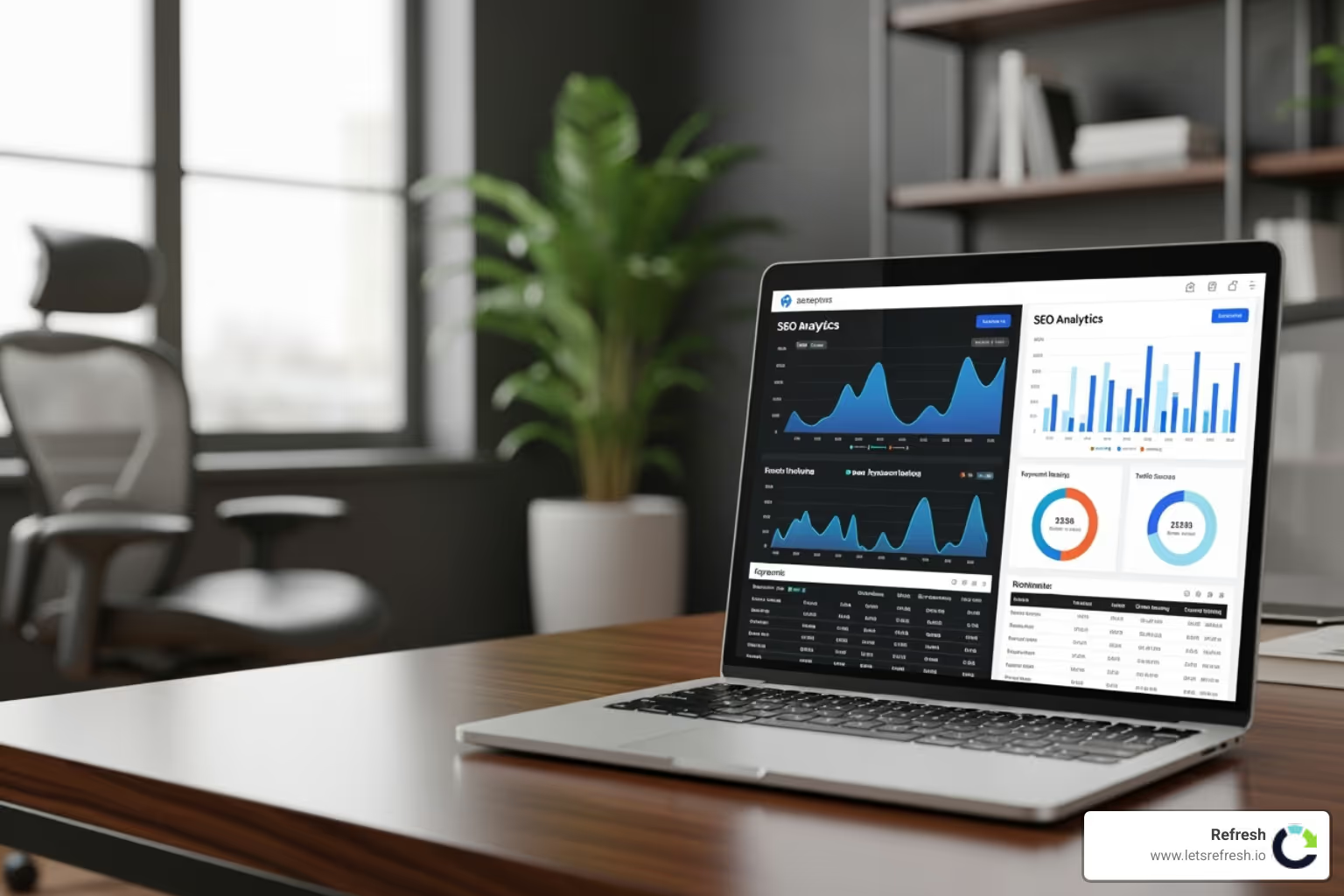Why Small Business SEO Is Your Gateway to Local Success
Small business SEO is the practice of optimizing your online presence to rank higher in local search results, connecting you with customers actively seeking your products or services. Key components include:
- Local SEO: Optimizing your Google Business Profile.
- On-Page SEO: Refining website content, titles, and meta descriptions.
- Technical SEO: Ensuring fast load speeds and mobile-friendly design.
- Content Creation: Publishing helpful, relevant content.
- Review Management: Encouraging and responding to customer reviews.
- Citation Building: Listing your business in online directories with consistent information.
The stakes are high. Research shows that 76% of people who conduct a local search on their smartphone visit a physical place within 24 hours, and 28% of those searches result in a purchase. Showing up when your ideal customers are searching is critical.
Fortunately, small business SEO doesn't require the complex strategies of large corporations. You can compete by focusing on local relevance and consistently implementing the right fundamentals.
I'm Alexander Palmiere. Over the past decade, my agency, Refresh Digital Strategy, has launched over 200 websites and developed small business SEO strategies that drive real results. I've seen how the right approach can transform a business's visibility and customer acquisition.
Simple small business SEO glossary:
- best local SEO (https://letsrefresh.io/blog/best-local-seo)
- local SEO services (https://letsrefresh.io/blog/local-seo-services)
The Foundations of SEO for Small Businesses
Imagine a local bakery owner. When someone nearby searches "bakery near me," will your business appear, or will they go to a competitor? This is where small business SEO becomes your secret weapon. Unlike paid advertising, where you rent visibility, SEO is like buying digital real estate. It takes time to build, but it keeps working for you around the clock.
Search engines like Google work like efficient librarians through a three-step process:
- Crawling: Digital scouts explore the web to find new and updated pages.
- Indexing: This information is organized into a massive, searchable database.
- Ranking: The engine sifts through the index to show the most relevant results for a search.
This process is why SEO requires patience. Your content needs time to be found, indexed, and recognized as valuable.
Here's how SEO compares to paid advertising:
| Feature | Small Business SEO | Paid Search Advertising |
|---|---|---|
| Timeline | 3-6 months to see real impact | Results start immediately |
| Cost Structure | Mostly time investment, or around $3,500/month for professional help | Pay for every single click |
| Longevity | Keeps working even when you're sleeping | Stops the moment you stop paying |
| Trust Factor | People trust organic results more | Users know they're seeing ads |
| Sustainability | Builds momentum over time | Requires constant budget |
The beauty of SEO is that it's a long-term investment that creates a foundation that gets stronger with time.
For a deeper dive into how we approach this strategy, check out our SEO Strategy for Small Business guide (https://www.letsrefresh.io/blog/seo-strategy-for-small-business).
What is Small Business SEO and Why Is It Crucial?
Small business SEO is the art of ensuring your ideal customers find you when they're actively looking for what you offer. Here's why it's so important:
- Compete with the big players. SEO levels the playing field. A well-optimized local business can outrank a national chain by being more relevant to local searchers.
- Stretch your marketing budget. Once you've invested in solid SEO, the traffic you receive is essentially free, unlike paid ads where every visitor costs money.
- Build trust automatically. Appearing in organic search results makes your business seem more credible than a paid ad.
- Increase brand familiarity. Seeing your business name repeatedly in search results creates recognition, so you're top-of-mind when customers are ready to buy.
- Achieve compounding growth. Each piece of optimized content, positive review, and quality backlink strengthens your online presence over time.
How Search Engines Work for Local Queries
For local searches, engines act as matchmakers using three key factors: relevance, distance, and prominence.
- Relevance: This is about matching search intent. If someone searches "emergency dentist," Google shows practices that handle emergencies. Your website content and service descriptions signal your relevance.
- Distance: Google considers the searcher's location and where they might be heading. A tourist searching for a coffee shop might see different results than a local resident.
- Prominence: This measures how well-known and trusted your business is online. It's based on signals like the quantity and quality of your online reviews, backlinks from other sites, and your overall digital footprint.
Google also evaluates content through E-E-A-T: Experience, Expertise, Authoritativeness, and Trustworthiness. For small businesses, this means showcasing real experience, demonstrating expertise with helpful content, building authority through community connections, and establishing trust with transparent information and testimonials.
To understand how Google evaluates local businesses, see their official guidance, "Learn how Google ranks local results" (https://support.google.com/business/answer/7091#zippy=%2Cprominence).
The Core Pillars of Your Small Business SEO Strategy
Think of your small business SEO strategy like building a house. You need a solid foundation and strong pillars to support everything. For SEO, these three pillars—On-Page, Technical, and Off-Page—work together to create a structure that helps your business thrive online.

Each pillar reinforces the others. Great content (on-page) is useless if your site won't load (technical), and backlinks (off-page) won't help if your content is thin. When all three work together, you get results.
Pillar 1: On-Page SEO and High-Quality Content
On-page SEO is everything you control directly on your website. Key elements include:
- Title Tags: The headline in search results. Keep it under 60 characters and include your main keyword. Example: "Fresh Artisan Bread & Pastries | Downtown Bakery Charlotte."
- Meta Descriptions: Your 155-character elevator pitch in search results. It doesn't impact rank but convinces users to click.
- Header Tags (H1, H2, H3): These structure your content for readers and search engines. Your H1 should contain your main keyword, while H2s and H3s break up the text.
- Image Optimization: Use descriptive file names (e.g.,
chocolate-chip-cookies-charlotte-bakery.jpg) and add alt text to describe the image for accessibility and context. - Internal Linking: Link between relevant pages on your site to help visitors and search engines find more of your content.
These technical elements only work with great content. Your user experience depends on creating content that genuinely helps people. Effective content types for small businesses include:
- Blog posts that share your expertise.
- How-to guides that showcase your skills.
- Case studies that build trust by showing past successes.
- FAQ pages that directly answer common customer questions.
The goal is to become the go-to resource in your area for topics that matter to your customers.
Pillar 2: Technical SEO for a Flawless User Experience
Technical SEO is the foundation of your website. If your site is slow or broken, even the best content won't perform well.
- Website Speed: Aim for a load time under three seconds. Site speed is a known ranking factor.
- Mobile-Friendliness: With over half of web traffic coming from mobile, your site must work perfectly on a smartphone. Google uses your mobile site for ranking.
- HTTPS Security: The padlock in the browser bar builds trust and is a minor ranking signal.
- Site Structure: A logical structure helps users and search engines steer your site. Any page should be reachable in 3-4 clicks.
- Crawlability: Ensure search engines can find and read your content by fixing broken links and avoiding confusing navigation.
- Schema Markup: This code helps search engines understand your content, which can lead to rich snippets (like star ratings) in search results.
You can check your site speed with Google's tool (https://pagespeed.web.dev/) for free.
Pillar 3: Local SEO and Off-Page Authority
This pillar is about building your reputation across the internet, which is crucial for local SEO.
- Backlinks: These are links from other websites to yours, acting as votes of confidence. Quality is more important than quantity. You can earn them through guest blogging, sponsoring community events, or asking suppliers for a link.
- Citations: These are mentions of your business name, address, and phone number (NAP). NAP consistency is key; your information must be identical everywhere.
- Online Directories: Listings on Yelp, Yellow Pages, and industry-specific sites provide citations and help customers find you.
- Customer Reviews: These are powerful for building trust and influencing local rankings. Actively encourage reviews and respond to all feedback to show you're engaged.
For a deeper dive into dominating your local market, explore our guide on Local SEO Services for Small Business (https://www.letsrefresh.io/blog/local-seo-services-for-small-business).
Your Action Plan: Key Steps to Improve Rankings
Now that you understand the concepts, it's time to take action. This is your roadmap to better rankings and more customers. Focus on these high-impact steps to get the best results from your small business SEO efforts.
Step 1: Master Your Local Presence with Google Business Profile
Optimizing your Google Business Profile is the single most important thing you can do for your local online presence. It's free, powerful, and often a customer's first impression of your business.
- Claim and Verify: First, claim and verify your profile to prove you're the authorized owner.
- Complete Your Profile: Fill out every section with accurate information: name, address, phone, website, hours, categories, and service descriptions. Complete profiles rank better.
- Upload High-Quality Media: Add photos and videos of your storefront, team, products, and happy customers. Businesses with 100+ images get significantly more calls.
- Use Google Posts: Share special offers, new products, or company news. These mini-updates keep your profile fresh.
- Manage the Q&A Section: Proactively add and answer common questions to provide helpful information.
- Respond to All Reviews: Engage with every review, both positive and negative. This shows you care about customer experience and are actively managing your reputation.
For more insights, see our article, "Why Google My Business is Essential for Your Company's Growth" (https://www.letsrefresh.io/blog/why-google-my-business-is-essential-for-your-companys-growth).
Step 2: Keyword Research: The Foundation of Small Business SEO
Keyword research helps you understand what your ideal customers are typing into Google. For small business SEO, the focus is on local intent and specific needs.
- Start with Seed Keywords: These are basic terms describing what you do (e.g., "bakery," "custom cakes").
- Focus on Long-Tail Keywords: These longer, specific phrases (e.g., "gluten-free wedding cakes in downtown Cleveland") show clear purchase intent.
- Use Local Intent Keywords: Combine services with locations (e.g., "pizza delivery Pittsburgh," "yoga classes near me").
- Analyze Volume and Difficulty: Target keywords with enough search volume to be worthwhile but not so competitive that you can't rank.
- Conduct Competitor Analysis: See what keywords your local competitors rank for to find gaps and opportunities.
The goal is to find the sweet spot where your offerings meet what customers are actively searching for.
Step 3: Build Authority with Backlinks and Reviews
Building authority means becoming a trusted, recognized part of your community, both online and off. This is achieved through quality backlinks and a strong review reputation.
Backlinks are digital word-of-mouth. When other credible sites link to you, it tells Google your business is trustworthy. Earn quality backlinks by:
- Guest blogging for local publications or related businesses.
- Sponsoring local events or charities that list sponsors on their websites.
- Asking suppliers to add you to their partner or "where to buy" pages.
Reviews are the voice of your customers and are incredibly powerful for local SEO. They build trust and influence rankings.
- Make it easy for happy customers to leave reviews by providing direct links to your profiles.
- Respond to all feedback, positive and negative, to show you are engaged and committed to service.
A business with many recent reviews often appears more trustworthy than one with only a few, even if they are perfect.
Measuring Success and Adapting for the Future
Measuring your small business SEO performance is crucial for understanding what's working and making smart decisions. It's about turning your efforts into measurable business growth.
Tracking Your SEO Performance
Google provides two powerful free tools: Google Analytics and Google Search Console. These are essential for tracking your performance.
- Google Analytics shows you who is visiting your website, where they came from, and what they do on your site.
- Google Search Console shows you how your site appears in Google Search, which search terms bring people to you, and any technical issues.
Key metrics to track for your small business SEO include:
- Organic Traffic: Visitors who find you through search engines. A consistent increase is a great sign.
- Keyword Rankings: Your position in search results for key terms.
- Click-Through Rate (CTR): The percentage of people who see your listing and click on it.
- Bounce Rate: The percentage of visitors who leave after viewing only one page.
- Conversions: The number of visitors who take a desired action, like calling or filling out a form.
- Local Pack Rankings: Your visibility in the top 3 map listings on Google, which can be a game-changer.
SEO requires ongoing monitoring and adjustment. Consistently tracking your progress will ensure your efforts compound over time.
The Impact of AI on Small Business SEO
Artificial intelligence is changing how people search. Conversational queries ("Hey Google, what's the best Italian restaurant near me?") and AI-generated summaries at the top of search results are becoming common. This is often called Answer Engine Optimization.
While Google's AI Overviews might answer some questions directly, they pull information from reliable websites. This makes your content more important than ever. To adapt, you must position your business as the go-to expert in your field.
Creating unique, expert content is the key. AI can generate generic advice, but it can't replicate your real-world experience, customer stories, or deep local knowledge. This is what makes your content irreplaceable and valuable to both users and AI.
This AI shift creates an opportunity. Focus on being the most helpful, trustworthy business in your area, and technology will work in your favor.
Frequently Asked Questions about Small Business SEO
Here are the honest answers to the most common questions business owners have about small business SEO.
How long does it take to see results from SEO?
SEO takes time. There is no magic button for instant results. You can expect to see some initial movement in 4-8 weeks, especially with Google Business Profile optimizations. However, for meaningful traffic increases and leads, plan for 3-6 months of consistent effort. For SEO to become a reliable customer acquisition machine, it often takes 6-12 months.
Think of SEO like planting a tree; it takes time to grow, but once it does, it provides value for years. Paid ads are like buying fruit from the store; you get it now, but you have to keep paying.
How much should a small business budget for SEO?
The cost of small business SEO varies based on your market, competition, and goals.
- DIY: Your main investment is time. Expect to spend several hours per week learning and implementing.
- Professional Help: An SEO specialist might charge $75-$100 per hour. An agency investment is often around $3,500 per month with a minimum six-month commitment.
A realistic monthly budget for most small businesses falls between $500 and $2,000. View this as an investment that builds long-term value, not a short-term expense.
Can I do SEO myself or should I hire an agency?
You can absolutely do much of this yourself. The basics, like optimizing your Google Business Profile and creating content, are accessible to business owners.
However, consider the trade-offs. Your time is valuable. An agency brings years of expertise, access to expensive tools, and the ability to diagnose problems and adapt to algorithm changes quickly. Professionals can often achieve results more efficiently because they know which tactics to prioritize.
My recommendation: start with the basics yourself. If you get overwhelmed or aren't seeing progress after a few months, it's time to bring in professional help. The most successful partnerships combine your deep customer knowledge with an agency's technical expertise.
Conclusion
Congratulations on learning the fundamentals of small business SEO. Knowing what to do is the first step, but consistent action is what separates successful businesses from the rest.
SEO is a marathon, not a sprint. The businesses that win are the ones that stick with it, month after month, creating helpful content and building a strong online reputation.
While the digital world evolves, the fundamentals remain the same. Focus on providing real value to your customers through an optimized Google Business Profile, helpful content, a fast website, and genuine customer reviews. That is the core of sustainable small business SEO.
At Refresh, we partner with businesses for this long-term journey. We do the consistent, strategic work that builds lasting results, so you can focus on what you do best: running your business.
If you're ready to stop feeling invisible online and start attracting customers who are already searching for you, we can help. Explore our comprehensive SEO services (https://www.letsrefresh.io/category/seo) and let's refresh your digital presence together.






.avif)


